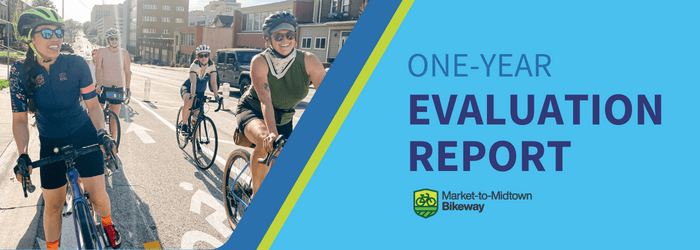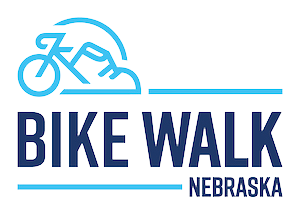
Photo by M. Julie Photo
Market-to-Midtown Bikeway shows 69% increase in bike share usage, and usage remains inline with highly successful first 6-months
Bike Walk Nebraska, in conjunction with Metro Smart Cities, Inc., has released the 12-month evaluation of the Market-to-Midtown Bikeway pilot project. The review includes bicyclist trends within Omaha and on the Bikeway, scooter and bike share usage data, rider testimonials, and insights on maintenance challenges.
The full report can be found here.
The most notable statistic comes from Heartland Bike Share, reporting a 69% increase in the use of stations along the Market-to-Midtown corridor.
“This demonstrates the power of combining bike share with good infrastructure. When given the opportunity, people can choose the healthy and easy option of active transportation,” says Julie Harris, Bike Walk Nebraska Executive Director.
Other findings from the report show consistent use of the Bikeway throughout the week, indicating the Midtown-to-Market Bikeway is being used for transportation, and not only, recreational purposes.
“For about 15 years, I have been a bicycle commuter. For me, the Market-To-Midtown Bikeway has been a dream come true. Much of the time, I am comfortable riding with vehicular traffic, but when my destination aligns with the bikeway, I choose it. It is my hope that the bikeway will serve as a model of what's possible, and lead toward the adoption of other bikeways connecting other parts of the city and making the roads safe for all road users,” shares Scott Redd.
As the end date of this pilot project approaches, Bike Walk Nebraska looks to the future.
“The pilot project has been successful and is on a good path towards meeting the performance metrics outlined by the City. We look forward to continuing to gather feedback and data that can be used for the final report later this fall,” states Harris.
The report also shares insights on maintenance challenges, including bollard replacement, ice melt, and runoff. However, many of the challenges reported are a function of the pilot project design and could be addressed in a permanent installation.
The evaluation covers the period of January - July 2022.

